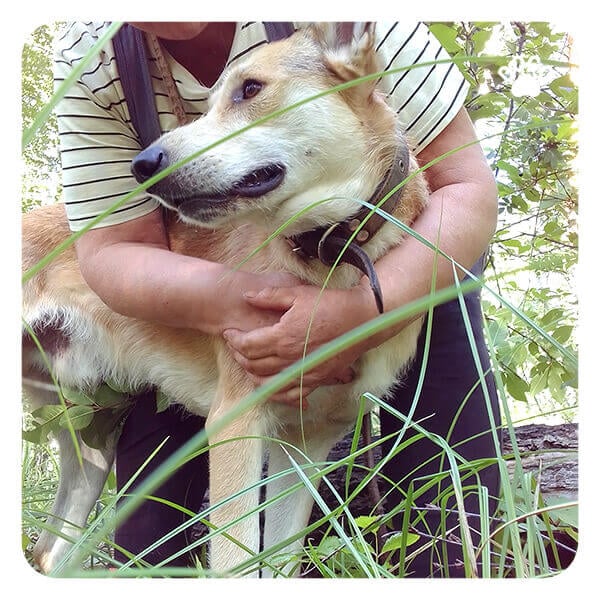 Did you know that dogs can suffer from allergies in the same way that humans do? An allergy is a state of over-reactivity or hypersensitivity of the immune system to a particular substance called an allergen. Several different types of allergies could be causing your dog’s symptoms. Unfortunately, allergies are pretty common in dogs of all breeds. There are different types of allergies in dogs. The most common ones include food allergies, insect allergies, or environmental allergies. Other factors that can cause your dog allergies include contact with another dog, object, plant, chemical substance, canine acne, malnutrition, and yeast or fungi.
Did you know that dogs can suffer from allergies in the same way that humans do? An allergy is a state of over-reactivity or hypersensitivity of the immune system to a particular substance called an allergen. Several different types of allergies could be causing your dog’s symptoms. Unfortunately, allergies are pretty common in dogs of all breeds. There are different types of allergies in dogs. The most common ones include food allergies, insect allergies, or environmental allergies. Other factors that can cause your dog allergies include contact with another dog, object, plant, chemical substance, canine acne, malnutrition, and yeast or fungi.
Food Allergies
Many dog parents may not suspect food allergies cause their dog’s itching because their pup has been fed the same food. In reality, dogs can develop allergies to particular food or ingredients over time. Food allergies can develop at almost any age. In addition, food allergy can produce any clinical signs such as itching, digestive disorders, and respiratory distress.
If you suspect your dog has a food allergy, you may want to try an elimination diet to identify the culprit. An elimination diet involves feeding your dog a novel protein source, such as venison or rabbit, and a carbohydrate source like sweet potato or peas. This diet should be maintained for at least 12 weeks to determine if there is a change in your dog’s symptoms. If your dog’s symptoms improve, you can gradually reintroduce other foods, one at a time, to identify the problematic ingredient. It is essential to work with your veterinarian to ensure that your dog maintains a balanced diet while undergoing an elimination diet.
Flea and Insect Bite Allergy
 Insect bite allergy is the exaggerated inflammatory response to the bite or sting of an insect. Spiders, ticks, fleas, blackflies, deerflies, horseflies, mosquitos, ants, bees, hornets, and wasps can cause an allergic reaction in sensitive dogs. Flea saliva is by far the most common insect allergen. Dogs can get an allergic reaction to fleas but not to the flea itself, but rather to proteins in its saliva. A single bite can cause a reaction for five to seven days.
Insect bite allergy is the exaggerated inflammatory response to the bite or sting of an insect. Spiders, ticks, fleas, blackflies, deerflies, horseflies, mosquitos, ants, bees, hornets, and wasps can cause an allergic reaction in sensitive dogs. Flea saliva is by far the most common insect allergen. Dogs can get an allergic reaction to fleas but not to the flea itself, but rather to proteins in its saliva. A single bite can cause a reaction for five to seven days.
If you suspect your dog has an insect bite allergy, it is crucial to take preventive measures. Regularly grooming your dog and keeping them clean can help to minimize the risk of an allergic reaction. You may also want to use flea and tick preventatives to control infestations. If your dog develops an allergic reaction to an insect bite, you can apply a cold compress to help reduce swelling and itching. Your veterinarian may also recommend antihistamines or corticosteroids to help alleviate your dog’s symptoms. In severe cases, your dog may require emergency care.
Seasonal or Environmental Dog Allergies
Suppose you notice your dog has symptoms of itching, chewing on their paws, licking, or sneezing around the same time every year. In that case, there’s a chance your dog has seasonal allergies. Seasonal or environmental allergies are caused by substances in your home, backyard, and anywhere else that your dog spends time outdoors. Dogs can get the same allergic reaction that people get with tree pollens (cedar, ash, oak, etc.) of trees, grass pollens, weed pollens, house dust mites, molds, and mildew.
Dog Allergy Signs
Dog allergy signs and symptoms to look for include:
- “hot spots”,
- itchy flaky skin,
- patchy skin,
- watery eyes,
- runny discharge from the eyes or nose,
- sneezing,
- scratching,
- chewing,
- constant licking,
- licking of the paws and anus,
- face rubbing,
- rubbing against the floor,
- biting the skin,
- red skin,
- loss of fur,
- poor coat texture or hair length,
- gastrointestinal pain and discomfort,
- foul odor,
- scabs,
- open wounds,
- hives,
- diarrhea,
- vomiting,
- shaking their head and scratching one or both ears,
- chronic ear and skin infections,
- smelly ears,
- respiratory congestion.
When to Take to Emergency Care
There are several cases where you should seek emergency care for your dog’s allergies, and there are four signs and symptoms to look out for:
1. Swelling of the ears, eyelids, or face
If you notice that your dog begins to develop swollen eyes and ears, it could be an allergic reaction to an insect bite or sting, plants, new medications, or environmental factors.
2. Scratching and shaking of the ears
If you see that your dog is constantly scratching or shaking their ears, then you will want to get them to your emergency vet immediately. Scratching and shaking of the ears are often signs of an ear infection in your dog. It is widespread for allergies to cause ear infections, especially in breeds that have floppy ears. These ear infections can be highly uncomfortable for your dog, so it is best to take them to your vet to alleviate the pain. Ear infections are painful and uncomfortable for dogs, and they can also lead to more severe conditions.
3. Vomiting and diarrhea
Vomiting and diarrhea may indicate that your dog has a food allergy. It is best to contact your vet immediately because continued vomiting and diarrhea can cause dehydration and electrolyte imbalances in your dog.
4. Ocular discharge
If you notice any yellow or green discharge from either one or both of your dog’s eyes, it is crucial to seek immediate care. It can be a sign that your dog has conjunctivitis, an eye condition that allergies can cause.
Diagnosis
There are several different testing methods to diagnose what your dog is allergic to. It will help have a specific treatment and therapy plan. The most common is a blood test that checks for antigen-induced antibodies in the dog’s blood.
Treatment
 Once your vet performs an allergy test on your dog to help determine the root cause, they will follow up with a treatment plan to help your dog heal. The type of treatment your dog will need will depend on the cause and nature of your dog’s allergy, its location on the body, and other factors. Treatments may include laser treatments, immunotherapy, oral antihistamine medications, medicated baths, and more. For example, your vet may recommend a treatment plan to have your dog get frequent baths. Bathing your dog with hypoallergenic shampoos can help remove possible allergens like pollen and grass. In addition, frequent bathing with a hypoallergenic shampoo can be soothing to itchy, inflamed skin.
Once your vet performs an allergy test on your dog to help determine the root cause, they will follow up with a treatment plan to help your dog heal. The type of treatment your dog will need will depend on the cause and nature of your dog’s allergy, its location on the body, and other factors. Treatments may include laser treatments, immunotherapy, oral antihistamine medications, medicated baths, and more. For example, your vet may recommend a treatment plan to have your dog get frequent baths. Bathing your dog with hypoallergenic shampoos can help remove possible allergens like pollen and grass. In addition, frequent bathing with a hypoallergenic shampoo can be soothing to itchy, inflamed skin.
Talk to Your Vet
It is essential to talk to your veterinarian about dog allergies and find out the best course of action for treatment. So you can get your dog the best help they need. When in doubt, seek immediate care so your dog is no longer in any pain or discomfort. And also so that you and your pup can go back to enjoying your time together.



